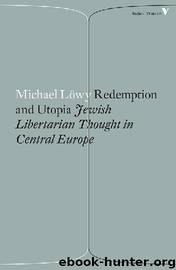Redemption and Utopia: Jewish Libertarian Thought in Central Europe (Radical Thinkers) by Michael Lowy

Author:Michael Lowy [Lowy, Michael]
Language: eng
Format: epub
Publisher: Verso Books
Published: 2017-03-27T16:00:00+00:00
This led Bloch to admit in 1923 that the state could be, as it was in Bolshevism, a temporary ‘necessary evil’ – a theme that set him apart, of course, from anarchist views properly so called. Never the less, Bloch emphasized that, from a socialist point of view, the state had to wither away and be replaced by a simple ‘international organization of production and consumption’.58 In Geist der Utopie, Bloch did not mention any anarchist author, but in an essay written around the same time as the first edition (1918), he hailed Hugo Ball the ‘Christian Bakuninist’, and the idea of anarchy as ‘the multi-coloured, multiform and direct word of Christ’. In Bloch’s eyes, the most radical utopia of the future was that of Bakunin: ‘the confederation, freed of all “states” and of all authoritarian “organizations”.’59
Bloch’s religiosity drew its inspiration from Christian sources – the Apocalypse, Joachim de Flore, the mystics and heretics of the Middle Ages – as well as from Jewish texts such as the Old Testament (notably the books of Deuteronomy and Isaiah), the cabbala (and Christian cabbalists), Hasidism, and the writings of Buber.60 In an interview that he gave to Jean-Michel Palmier in 1976, Bloch hinted that his interest in the cabbala and in the philosophy and tradition of German Romanticism began at the same time.61 This would be typical of members of the intelligentsia who came from completely assimilated families, and who discovered messianism and Jewish mysticism through writers like Baader, Schlegel or Molitor.
According to Emmanuel Levinas, Bloch’s Jewish culture ‘probably involved no more than a reading of the Old Testament (in translation) and various elements of folklore imported from Eastern European Jews, with their Hasidic tales that were greatly appreciated in the West’.62 It seems to me, however, that Levinas’s assessment is far from accurate. Bloch’s early writings showed a fairly good knowledge of the cabbala and of literature on Jewish mysticism. Thus, the first edition of Geist der Utopie (1918) contains numerous references to the cabbala and cabbalistic themes (Schechina, Adam Kadmon), to Jewish (Meir ben Gabbai, Eyebeschütz) or Christian (Molitor) cabbalists – and, of course, to the Baal-Schem.63
Bloch’s attitude towards Judaism was complex. One of the few texts in which he expressed his views on the subject was the chapter ‘Symbol: die Juden’ (‘Jews: A Symbol’), which was published in the first edition of Geist der Utopie, but not in the 1923 edition. (It was, however, included in the collection Durch die Wüste, also published in 1923.) In that chapter, Bloch rejected both the assimilationism of the free-thinking, non-religious Jewish bourgeoisie and the preservation of the traditional ghetto in Eastern Europe. As for Zionism, he suggested that ‘in using the concept of nation-state – which had rather fleeting currency in the nineteenth century – it wanted to change Judea into a type of Asiatic Balkan State’. Bloch did, however, value the historical continuity of the ‘people of the Psalms and of the prophets’, and he was delighted at the ‘awakening of Jewish pride’ that was taking place at the time.
Download
This site does not store any files on its server. We only index and link to content provided by other sites. Please contact the content providers to delete copyright contents if any and email us, we'll remove relevant links or contents immediately.
| Haggadah | Hasidism |
| History | Holidays |
| Jewish Life | Kabbalah & Mysticism |
| Law | Movements |
| Prayerbooks | Sacred Writings |
| Sermons | Theology |
| Women & Judaism |
The Power of Habit by Charles Duhigg(3128)
Man's Search for Meaning by Viktor E. Frankl(2669)
Mckeown, Greg - Essentialism: The Disciplined Pursuit of Less by Mckeown Greg(2428)
MOSES THE EGYPTIAN by Jan Assmann(2411)
Devil, The by Almond Philip C(2324)
The Complete Dead Sea Scrolls in English (7th Edition) (Penguin Classics) by Geza Vermes(2274)
Unbound by Arlene Stein(2267)
I Capture the Castle by Dodie Smith(2034)
Schindler's Ark by Thomas Keneally(1878)
The Invisible Wall by Harry Bernstein(1799)
The Gnostic Gospel of St. Thomas by Tau Malachi(1788)
The Bible Doesn't Say That by Dr. Joel M. Hoffman(1676)
The Secret Doctrine of the Kabbalah by Leonora Leet(1601)
Political Theology by Carl Schmitt(1577)
The Jewish State by Theodor Herzl(1533)
A History of the Jews by Max I. Dimont(1529)
The Dead Sea Scrolls Bible by Martin G. Abegg(1511)
The Book of Separation by Tova Mirvis(1485)
Oy!: The Ultimate Book of Jewish Jokes by David Minkoff(1364)
